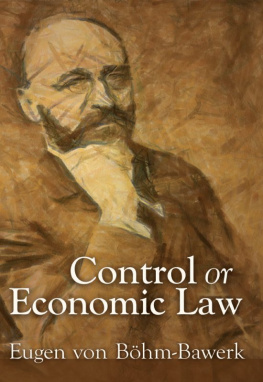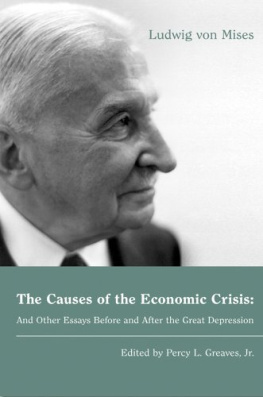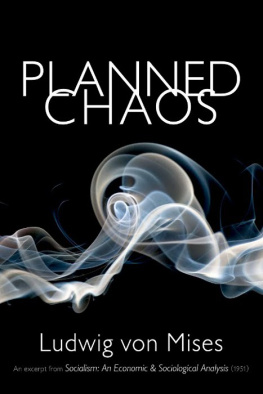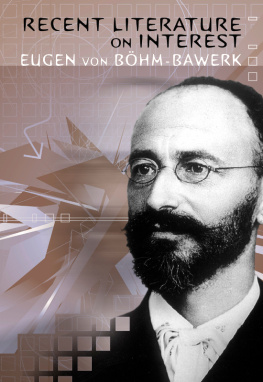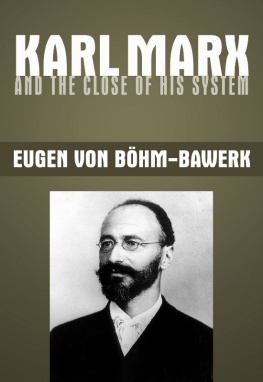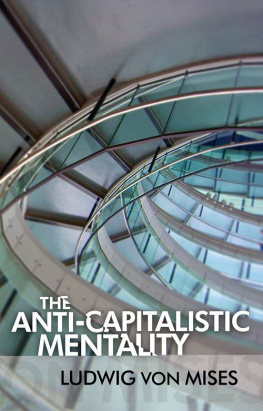Controlor
Economic Law
Controlor
Economic Law
Eugen von Bhm-Bawerk

MISES INSTITUTE

Control or Economic Law first appeared in the Zeitschrift fr Volkswirtshaft, Sozialpolitik und Verwaltung, Volume XXIII (1914): 20571; translation is by John Richard Mez, Ph.D.
2010 by the Ludwig von Mises Institute and published under the Creative Commons Attribution License 3.0.
Ludwig von Mises Institute
518 West Magnolia Avenue
Auburn, Alabama 36832
www.mises.org
ISBN: 978-1-933550-71-8
Contents
I. The Scientific Foundation of a Rational Economic Policy
ECONOMIC THEORY, FROM ITS VERY BEGINnings, HAS ENDEAVORED TO discover and formulate the laws governing economic behavior. In the early period, which was under the influence of Rousseau and his doctrines of the laws of nature, it was customary to apply to these economic laws the name and character of physical laws. In a literal sense, this characterization was, of course, open to objection, but possibly the term physical or natural laws was intended merely to give expression to the fact that, just as natural phenomena are governed by immutable eternal laws, quite independent of human will and human laws, so in the sphere of economics there exist certain laws against which the will of man, and even the powerful will of the state, remain impotent; and that the flow of economic forces cannot, by artificial interference of societal control, be driven out of certain channels into which it is inevitably pressed by the force of economic laws.
Such a law, among others, was considered to be that of supply and demand, which again and again had been observed to triumph over the attempts of powerful governments to render bread cheap in lean years by means of unnatural price regulations, or to confer upon bad money the purchasing power of good money. And inasmuch as in the last analysis, the remuneration of the great factors of productionland, labor, and capitalin other words, the distribution of wealth among the various classes of society, represents merely one case, although the most important practical case of the general laws of price, the entire all-important problem of distribution of wealth became dependent upon the question of whether it was regulated and dominated by natural economic laws, or by the arbitrary influence of social control.
The early economists did not hesitate to decide this question with fearless consistency in favor of the exclusive predominance of natural laws. The most famous, or rather notorious, illustration of this interpretation was the wagefund theory of the classic and postclassic school of economists, according to which the amount of wages was determined by a natural relationship of almost mathematical accuracy thought to exist between the amount of capital available in a country for the payment of wages, the so-called wage fund, and the number of workers. All workers jointly were considered incapable of ever receiving more than the existing wage fund, and the average was thought to result with mathematical accuracy from the division of the wage fund by the number of workers. No artificial outside interference, including strikes, could change the operation of this law. For if, through a successful strike, the wages of one group of workers were to have been raised artificially, a correspondingly smaller portion of the wage fund would be available for the remaining workers, whose wages would then have to come down accordingly. A general or average increase of wages above the total of the wage fund was held to be out of the question.
Later generations have adopted a different view of this matter and of economic laws in general, and have developed different new formulas in accordance with their changed views. Following the example of Rodbertus and Adolf Wagner, a distinction was drawn between purely economic categories and historic legal
This may have been right or wrong, but it was certainly not without some justification. But how far-reaching was the influence of control to be, and how and where was it to be delimited against the influences emanating from the other categories? These questions were not, and have never been, definitely settled to this day. A few years ago, at another occasion, I wrote, Nowadays it would be idiotic to try to deny the influence of institutions and regulations of social origin on the distribution of goods.
It is obvious that distribution under a communistic order would have to be materially different from that in an individualistic society, based on the principle of private property. Nor could any sensible person deny that the existence of labor organizations with their weapon of strikes has been of pronounced influence on the fixation of wages of labor. But, on the other hand, no intelligent person would claim social price regulation as being omnipotent and decisive in itself alone.
Often enough one has seen governmental price regulations to be incapable of providing cheap bread in lean years. Every day we may see strikes failing, when they are directed towards the attainment of wages not justified in the economic situation, as it is commonly expressed. The question, therefore, is not whether the natural or purely economic categories on the one hand, and the social categories on the other, do exert any appreciable influence on the terms of distribution; that both do, no intelligent person will deny.
The sole question is this: how much influence do they exert? Or, as I have expressed myself several years ago, in reviewing an older work by Stolzmann entitled Die Soziale Kategorie,
The great problem, not adequately settled so far, is to determine the exact extent and nature of the influence of both factors, to show how much one factor may accomplish apart from, or perhaps in opposition to, the other. This chapter of economic theory has not yet been written satisfactorily.
I should like to go almost so far as to say that, until quite recently, not even a serious attempt has been made to elaborate this problem by either one of the two great schools that compete with each other in the perfecting of our science: the theoretical school, represented primarily by the well-known marginal-utility theory, and the historic or sociological school, which, in its struggle against both the old classicists and the modern marginal-value theorists, likes to place the influence of control (Macht) into the very heart of its theory of distribution.
The marginal-value school has not ignored the problem confronting us here, but so far, it has not elaborated it extensively; it has conducted its investigations up to the confines of the whole problem, so to speak, but so far, has stopped at these confines. So far, it has principally occupied itself with the developing of the laws of distribution under the assumption of free and perfect competition, perfect both in theory and in practice, thus precluding the predominance of one party, as would be implied in the term influence of control.
Under this, and the other modifying assumption of the exclusive prevalence of purely economic motives, the marginal-value theory has come to the conclusion that, in the process of distribution, each separate factor of production receives approximately that amount in payment for its contribution to the total production that, according to the rules of imputation, is due to its cooperation in the process of production. The shortest formulation of this idea is contained in the familiar concept of the marginal productivity of each factor.
Next page
